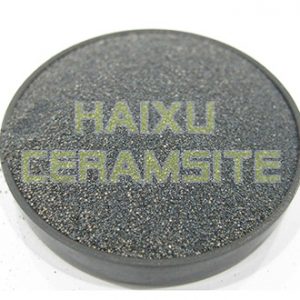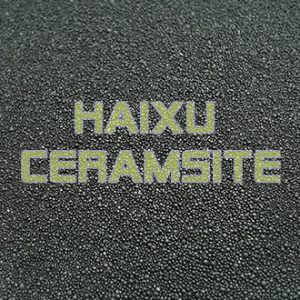Resin coated Ceramic sand AFS115
Resin coated Ceramic sand AFS115 is a casting sand made by premixing ceramic sand with a resin binder as the raw sand. Resin coated Ceramic sand is mainly used in the core-making process of coated sand casting and is suitable for cold core box and hot core box core making. Coated sand casting produces castings with high precision, simple operation, and high production efficiency. Especially after using pearl sand, can improve the mechanical strength and physical properties of the core. Using the ceramic sand coated sand process can also recycle the coated sand and reduce the production line operation cost.
Resin coated Ceramic sand AFS115 Features:
- High fire resistance temperature.
The fire resistance of ceramic sand is above 1800 ℃. Especially when casting materials with high angular temperatures such as stainless steel, high alloy steel, and heat resistant steel, the advantages of using bead sand are very obvious. The coated sand made of ceramic sand can effectively reduce defects such as sand sticking caused by insufficient fire resistance of molding sand. The high fire resistance of ceramic sand ensures that the sand mold does not stick without applying a fire resistant coating, ensuring the permeability of the molding sand, and saving coating costs and process labor costs.
- The amount of resin added and the amount of gas generated by the resin coated
ceramic sand is a spherical casting sand. When the coated sand hardens, the molding sand is bonded point to point. Compared to side-by-side bonding with silicon sand coated sand, using ceramic sand can increase the strength of the sand mold by more than 100% with the same amount of resin.
The amount of resin added to the coated sand made from ceramic sand can be reduced by at least 30% to 40%, and the amount of gas generated by molding sand can be reduced by at least half. Using bead sand in shell molding can effectively reduce the porosity of castings caused by the large amount of gas generated by the molding sand after coating.
- Reduce the amount of molding sand
The strength of ceramic sand is about twice that of silica sand, and the consumption of molding sand is generally reduced by about 30% – 40%. According to the 1:1 ratio of iron sand in the traditional shell molding process, when manufacturing 1000 tons of castings, the consumption of ceramic sand can save 200-300 tons of sand compared to silicon sand coated sand, effectively reducing the cost and turnover of molding sand.
- Improve casting quality
The thermal expansion rate of ceramic sand coated sand is much lower than that of silicon sand, which can effectively improve the quality of castings, reduce the rejection rate of castings, and reduce the time required for deburring and repairing during the post treatment process.
Reduce labor costs and improve production processes
The shape of ceramic sand is circular and spherical, which has good fluidity compared to polygonal sand of silicon sand. The sand shell is easy to fill during the shell making process, and using ceramic sand coated sand can fill the sand more tightly. Increasing the strength of molding sand can effectively reduce defective castings.
ceramic sand has good collapsibility, and workers do not need to labor to remove the sand, thereby saving labor costs.
- Cleaning and environmental protection
Silica sand has the defects of weak strength and high dust content, which not only causes serious pollution to the surrounding environment, but also easily causes occupational diseases such as pneumoconiosis among workers. Ceramic sand does not crack at high temperatures. This advantage can be solved by developing a better work environment. At the same time, the disadvantage of the molding sand becoming finer and finer during repeated use is avoided. Ceramic sand is an environmentally friendly casting sand.
Resin coated Ceramic sand AFS115 Chemical content:
| Refractoriness | ≥1800 ℃ |
| Mohs hardness | 6.5-7.5 |
| Specific gravity: | 3.4g/cm3 |
| Bulk density(LPD): | 1.95-2.05 g/cm3 |
| Color: | black brown |
| Grit shape: | spherical beads |
| PH Value | 7.3 |
| Thermal expansion coefficient | 6×10-6 /℃(20-1000℃) |
| Thermal conductivity | 0.698W/M.K(1200℃) |
| Thermal expansion ratio | 0.13% |
| coefficient of angularity | ≤1.1 |
| Roundness | Min 95% |
Resin coated Ceramic sand AFS115 Physical properties
| Item | Standard value |
| Met. Point ℃ | 100-115 |
| Cold. Tran MPA | ≥7 |
| Hot. Tran MPA | ≥2.5 |
| Gas.Evolu ML/G | ≤15 |
| Cold.Tensil MPA | ≥3.0 |
| Flowability | / |
| Throat reduction % | ≤2.5 |
| Storage Life | 180 days |
Resin coated ceramic sand AFS115 particle size distribution:
| MESH | VALUE-% |
| +50mesh | 0 |
| +70mesh | 0.4 |
| +100mesh | 17.8 |
| +140mesh | 41.3 |
| +200mesh | 28.7 |
| +270mesh | 11.2 |
| -270mesh | 0.2 |
| AFS | 117. |






